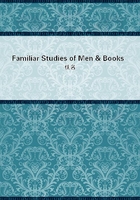
第95章
It must be understood that we know nothing of his intercourse with women (as indeed we know little at all about his life) until he came to Berwick in 1549, when he was already in the forty-fifth year of his age. At the same time it is just possible that some of a little group at Edinburgh, with whom he corresponded during his last absence, may have been friends of an older standing. Certainly they were, of all his female correspondents, the least personally favoured. He treats them throughout in a comprehensive sort of spirit that must at times have been a little wounding. Thus, he remits one of them to his former letters, "which I trust be common betwixt you and the rest of our sisters, for to me ye are all equal in Christ." (1) Another letter is a gem in this way.
"Albeit" it begins, "albeit I have no particular matter to write unto you, beloved sister, yet I could not refrain to write these few lines to you in declaration of my remembrance of you. True it is that I have many whom I bear in equal remembrance before God with you, to whom at present I write nothing, either for that I esteem them stronger than you, and therefore they need the less my rude labours, or else because they have not provoked me by their writing to recompense their remembrance." (2) His "sisters in Edinburgh" had evidently to "provoke his attention pretty constantly; nearly all his letters are, on the face of them, answers to questions, and the answers are given with a certain crudity that I do not find repeated when he writes to those he really cares for. So when they consult him about women's apparel (a subject on which his opinion may be pretty correctly imagined by the ingenious reader for himself) he takes occasion to anticipate some of the most offensive matter of the "First Blast" in a style of real brutality. (3) It is not merely that he tells them "the garments of women do declare their weakness and inability to execute the office of man," though that in itself is neither very wise nor very opportune in such a correspondence one would think; but if the reader will take the trouble to wade through the long, tedious sermon for himself, he will see proof enough that Knox neither loved, nor very deeply respected, the women he was then addressing.
In very truth, I believe these Edinburgh sisters simply bored him. He had a certain interest in them as his children in the Lord; they were continually "provoking him by their writing;" and, if they handed his letters about, writing to them was as good a form of publication as was then open to him in Scotland. There is one letter, however, in this budget, addressed to the wife of Clerk-Register Mackgil, which is worthy of some further mention. The Clerk-Register had not opened his heart, it would appear, to the preaching of the Gospel, and Mrs. Mackgil has written, seeking the Reformer's prayers in his behalf. "Your husband," he answers, "is dear to me for that he is a man indued with some good gifts, but more dear for that he is your husband.
Charity moveth me to thirst his illumination, both for his comfort and for the trouble which you sustain by his coldness, which justly may be called infidelity." He wishes her, however, not to hope too much; he can promise that his prayers will be earnest, but not that they will be effectual; it is possible that this is to be her "cross" in life; that "her head, appointed by God for her comfort, should be her enemy." And if this be so, well, there is nothing for it;
"with patience she must abide God's merciful deliverance," taking heed only that she does not "obey manifest iniquity for the pleasure of any mortal man." (4) I conceive this epistle would have given a very modified sort of pleasure to the Clerk-Register, had it chanced to fall into his hands.
Compare its tenor - the dry resignation not without a hope of merciful deliverance therein recommended - with these words from another letter, written but the year before to two married women of London: "Call first for grace by Jesus, and thereafter communicate with your faithful husbands, and then shall God, I doubt not, conduct your footsteps, and direct your counsels to His glory." (5) Here the husbands are put in a very high place; we can recognise here the same hand that has written for our instruction how the man is set above the woman, even as God above the angels. But the point of the distinction is plain. For Clerk-Register Mackgil was not a faithful husband; displayed, indeed, towards religion a "coldness which justly might be called infidelity." We shall see in more notable instances how much Knox's conception of the duty of wives varies according to the zeal and orthodoxy of the husband.
(1) Works, iv. 244.
(2) Works, iv. 246.
(3) IB. iv. 225.
(4) Works, iv. 245.
(5) IB. iv. 221.